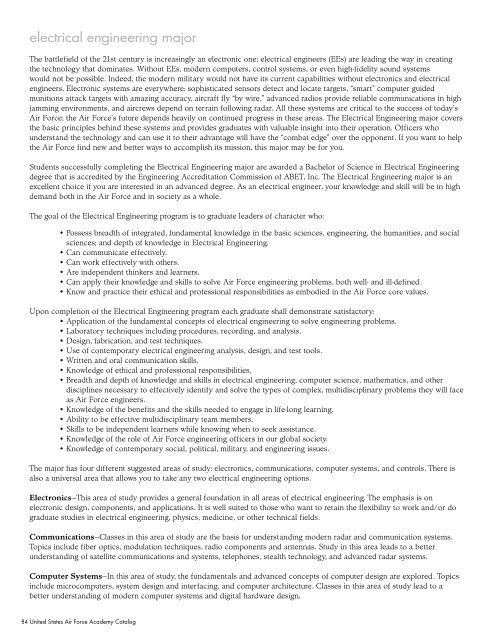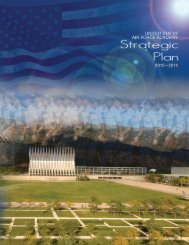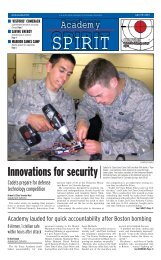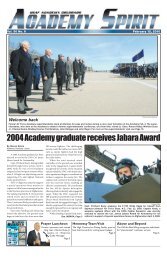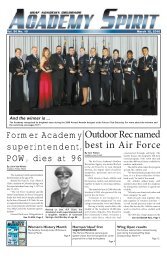2008-2009 Catalog - United States Air Force Academy
2008-2009 Catalog - United States Air Force Academy
2008-2009 Catalog - United States Air Force Academy
You also want an ePaper? Increase the reach of your titles
YUMPU automatically turns print PDFs into web optimized ePapers that Google loves.
electrical engineering major<br />
The battlefield of the 21st century is increasingly an electronic one; electrical engineers (EEs) are leading the way in creating<br />
the technology that dominates. Without EEs, modern computers, control systems, or even high-fidelity sound systems<br />
would not be possible. Indeed, the modern military would not have its current capabilities without electronics and electrical<br />
engineers. Electronic systems are everywhere: sophisticated sensors detect and locate targets, “smart” computer guided<br />
munitions attack targets with amazing accuracy, aircraft fly “by wire,” advanced radios provide reliable communications in high<br />
jamming environments, and aircrews depend on terrain following radar. All these systems are critical to the success of today’s<br />
<strong>Air</strong> <strong>Force</strong>; the <strong>Air</strong> <strong>Force</strong>’s future depends heavily on continued progress in these areas. The Electrical Engineering major covers<br />
the basic principles behind these systems and provides graduates with valuable insight into their operation. Officers who<br />
understand the technology and can use it to their advantage will have the “combat edge” over the opponent. If you want to help<br />
the <strong>Air</strong> <strong>Force</strong> find new and better ways to accomplish its mission, this major may be for you.<br />
Students successfully completing the Electrical Engineering major are awarded a Bachelor of Science in Electrical Engineering<br />
degree that is accredited by the Engineering Accreditation Commission of ABET, Inc. The Electrical Engineering major is an<br />
excellent choice if you are interested in an advanced degree. As an electrical engineer, your knowledge and skill will be in high<br />
demand both in the <strong>Air</strong> <strong>Force</strong> and in society as a whole.<br />
The goal of the Electrical Engineering program is to graduate leaders of character who:<br />
• Possess breadth of integrated, fundamental knowledge in the basic sciences, engineering, the humanities, and social<br />
sciences; and depth of knowledge in Electrical Engineering.<br />
• Can communicate effectively.<br />
• Can work effectively with others.<br />
• Are independent thinkers and learners.<br />
• Can apply their knowledge and skills to solve <strong>Air</strong> <strong>Force</strong> engineering problems, both well- and ill-defined.<br />
• Know and practice their ethical and professional responsibilities as embodied in the <strong>Air</strong> <strong>Force</strong> core values.<br />
Upon completion of the Electrical Engineering program each graduate shall demonstrate satisfactory:<br />
• Application of the fundamental concepts of electrical engineering to solve engineering problems.<br />
• Laboratory techniques including procedures, recording, and analysis.<br />
• Design, fabrication, and test techniques.<br />
• Use of contemporary electrical engineering analysis, design, and test tools.<br />
• Written and oral communication skills.<br />
• Knowledge of ethical and professional responsibilities.<br />
• Breadth and depth of knowledge and skills in electrical engineering, computer science, mathematics, and other<br />
disciplines necessary to effectively identify and solve the types of complex, multidisciplinary problems they will face<br />
as <strong>Air</strong> <strong>Force</strong> engineers.<br />
• Knowledge of the benefits and the skills needed to engage in life-long learning.<br />
• Ability to be effective multidisciplinary team members.<br />
• Skills to be independent learners while knowing when to seek assistance.<br />
• Knowledge of the role of <strong>Air</strong> <strong>Force</strong> engineering officers in our global society.<br />
• Knowledge of contemporary social, political, military, and engineering issues.<br />
The major has four different suggested areas of study: electronics, communications, computer systems, and controls. There is<br />
also a universal area that allows you to take any two electrical engineering options.<br />
Electronics—This area of study provides a general foundation in all areas of electrical engineering. The emphasis is on<br />
electronic design, components, and applications. It is well suited to those who want to retain the flexibility to work and/or do<br />
graduate studies in electrical engineering, physics, medicine, or other technical fields.<br />
Communications—Classes in this area of study are the basis for understanding modern radar and communication systems.<br />
Topics include fiber optics, modulation techniques, radio components and antennas. Study in this area leads to a better<br />
understanding of satellite communications and systems, telephones, stealth technology, and advanced radar systems.<br />
Computer Systems—In this area of study, the fundamentals and advanced concepts of computer design are explored. Topics<br />
include microcomputers, system design and interfacing, and computer architecture. Classes in this area of study lead to a<br />
better understanding of modern computer systems and digital hardware design.<br />
84 <strong>United</strong> <strong>States</strong> <strong>Air</strong> <strong>Force</strong> <strong>Academy</strong> <strong>Catalog</strong>


